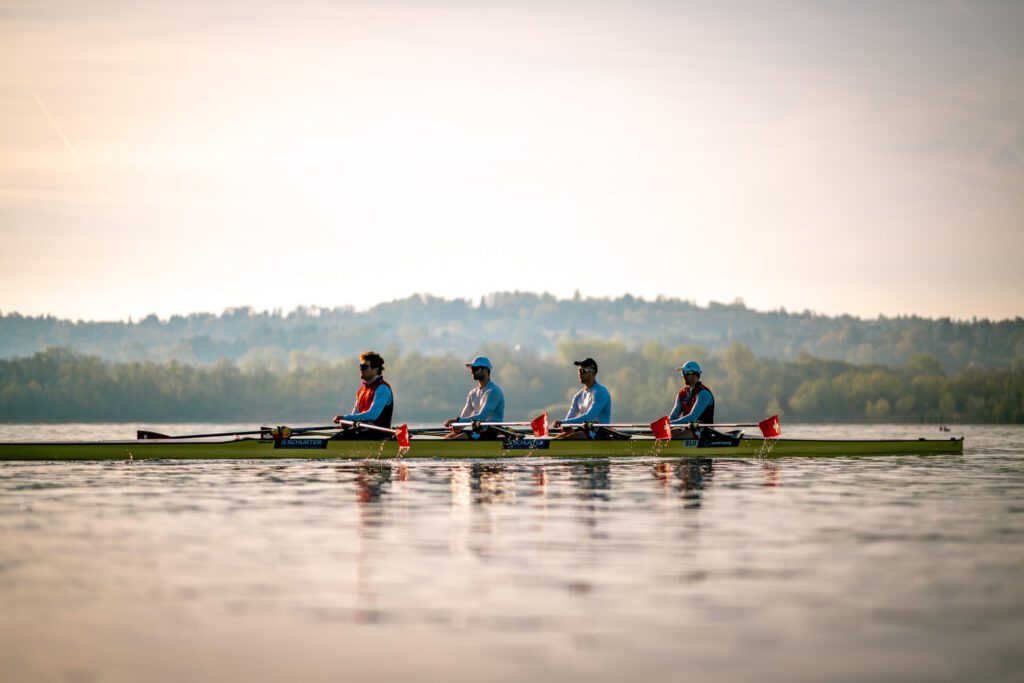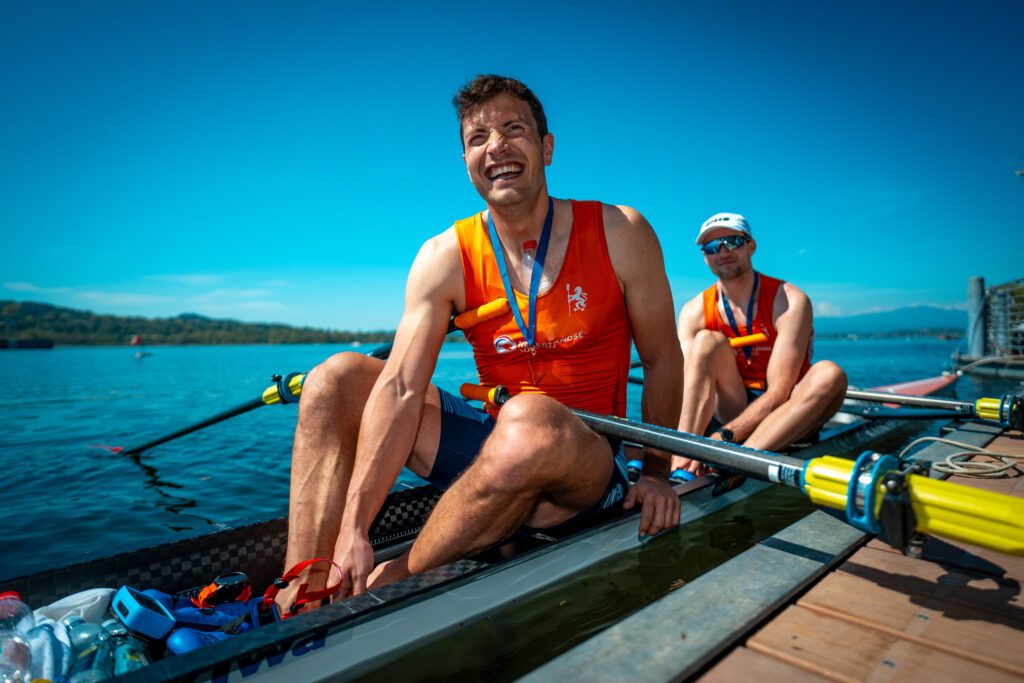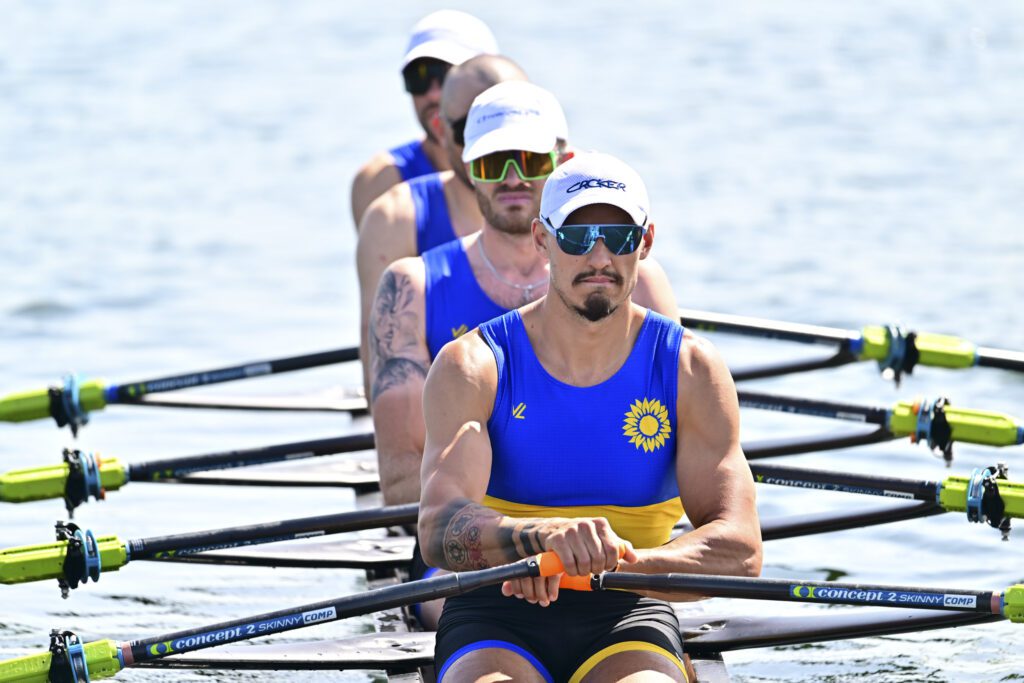Four A-finals left to go, and a dark and stormy morning at the Sea Forest Waterway. Clouds hovered over downtown Tokyo, rumbles of thunder were heard and nearly caused a stoppage to racing, only saved by the fact that the storms were moving away from the racecourse, not towards it. On the water the lightning came from the crews, with two new Olympic bests set by two new singles champions, and two scorching eights races to wind up the best show in town.
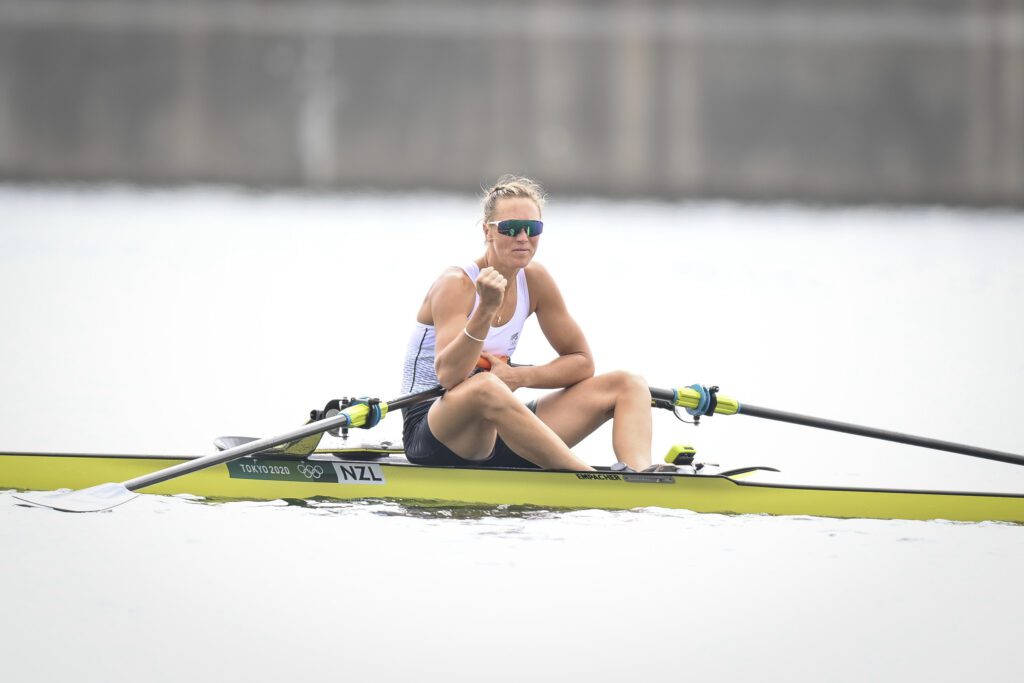
Photo Emma Twigg, NZL W1x winner
Emma Twigg has waited a long time for an Olympic medal of any colour. 9th in Beijing, her moment should have come in London or Rio, after Olympiads where she had shown her ability to win big sculling races. Fourth was the result in both, the Rio miss courtesy of an agonising 0.35 second gap to bronze, and spurring a retirement only revoked after time away and coming out to the world. This Games final, with powerhouse newcomer Hannah Prakatsen (ROC) on the 2021 scene, Twigg was leaving nothing to chance. She streaked into the lead as soon as she settled, Austrian Magdalena Lobnig the best of the rest and settling into yet another struggle with old rival Vicky Thornley (GBR), now that Irish world champion Sanita Puspure was out of the medal race. Briefly, under the mid-course bridge, Lobnig got a toehold of overlap on Twigg, but it didn’t last long, the Kiwi pushing away again within moments. And then Prakatsen started to go.
During the 2021 season, Prakatsen’s mid-race push has looked inexorable. Punching through the water, she drives like a train and stops for nothing. It’s seen off Puspure and the rest, race after race: the ROC sculler drops the hammer and nobody can hold her. Well it turns out that Twigg can. In the third quarter where Prakatsen normally does the most damage, she merely managed to swap places with Lobnig, Twigg’s lead unaffected. Prakatsen pushed, and Twigg simply pushed away again, demonstrating her dominance. Jeannine Gmelin (SUI) and Jiang Yan (CHN) came sneaking up from the back to motivate ROC, GBR and AUT to greater efforts, but Twigg sailed calmly on. With 300 to go she had won it, Prakatsen second and Lobnig sending the entire Austrian contingent into hysterics with third. The wise old Kiwi head beating the young gun. Magic, and a well-deserved Olympic best time by five seconds.
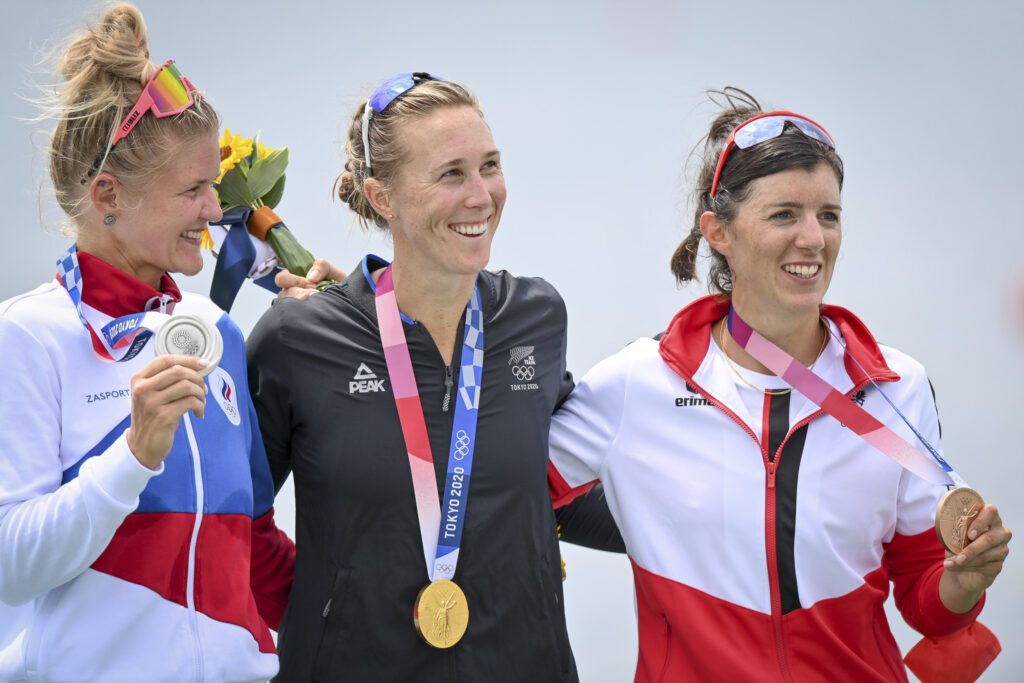
Photo Prakatsen, Twigg and Lobnig on the W1x Olympic podium
“I think it’s probably going to take some time to sink in”, Twigg told reporters afterwards. “I can’t believe it, honestly, crossing the line it was disbelief. I didn’t actually hear the hooter and I thought for a minute I’d stopped before [the end]. I’m lost for words. The message to those who don’t have the results is that if you believe in yourself and keep going and dreaming, this can be the result.”
The men’s race also lacked the world champion, Oli Zeidler winning the B-final half an hour earlier after being shredded by a super-fast attack from Stefanos Ntouskos the day before. That left 2013 doubles champion Kjetil Borch (NOR), Danish threat Sverri Nielsen, Croatia’s finest Damir Martin, ROC newcomer Alexander Vyazovkin, sprinter extraordinaire Mindaugas Griskonis, and Ntouskas lining up against one another. Perhaps to take charge and prevent a repeat of the Greek’s surprise, Borch went out early and hard, but had Nielsen’s nose in front of him for the first 600 metres. Looking either side of himself, Ntouskos clearly decided to get back in the game and edged back on the two leaders, pushing his bow back through them just before halfway. For a minute they tracked each other, the Danish and Norwegian bows just about level with Ntouskos’ body. Nielsen pushed a bit, the Greek pushed back. Then Borch’s turn, and back again Ntouskos regained his lead. And as Damir Martin came heaving up in the far lane, Ntouskos the former lightweight clinched it, Greece’s first ever rowing gold in a new Olympic best time, beating the quickest that Mahe Drysdale could produce in Rio as well as Borch’s best efforts. Stunning. Damir Martin, the man who lost out by a photofinish to Drysdale in 2016, made up half a boat-length within 100 metres to swipe bronze from Nielsen by 0.15 seconds.
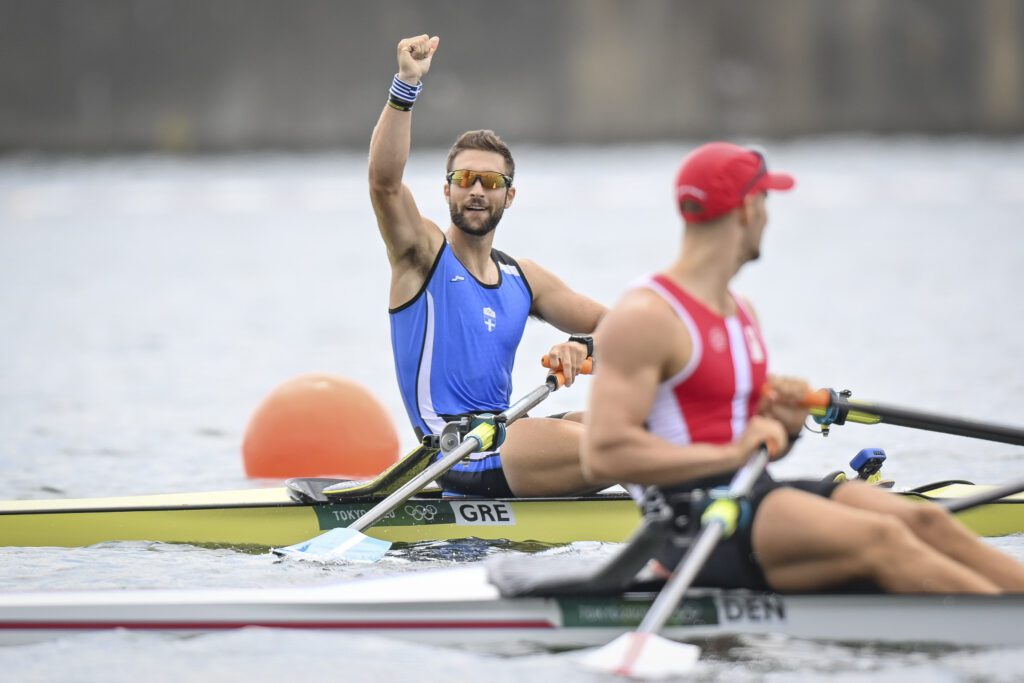
Photo Stefanos Ntouskos of GRE wins gold in the M1x
“I think we put on quite a show for the audience and the men’s single sculls has just been a firework since I started,” said Borch. “We’ve seen legends retire, new stars rise, it’s just been super exciting to be a part of this revolution of new scullers entering the world scene.” “I was in third place at 750 metres, I changed my rhythm and power, and then I was in front”, said Ntouskos. “I wanted to take a medal so much that I kept going, going. Who has the mentality to keep pushing is the toughest.”
And so to the eights, beginning with the juiciest women’s eights final of many years. Six crews any of whom could be on the medal podium, and at least three bidding for medals. The USA, technically defending champions, started well but could not keep up with Canada in lane two. Kept honest by Australia and New Zealand flanking them, the maple leafers held all the cards, ready to pounce on any attack. It stayed that way for a while, then China began to close on the USA in the minor places, Australia beginning to drop back and New Zealand trying to carve into the Canadian lead but unable to make an impression. Past 1500m gone, the Kiwis still battling, Canada still keeping them at arm’s length and China now challenging for third place. New Zealand one more time, taking inches per stroke, but not enough inches. And then the line was reached, and the dream was true. Canada, Olympic eights champions for the first time since 1992, you’d better believe it.
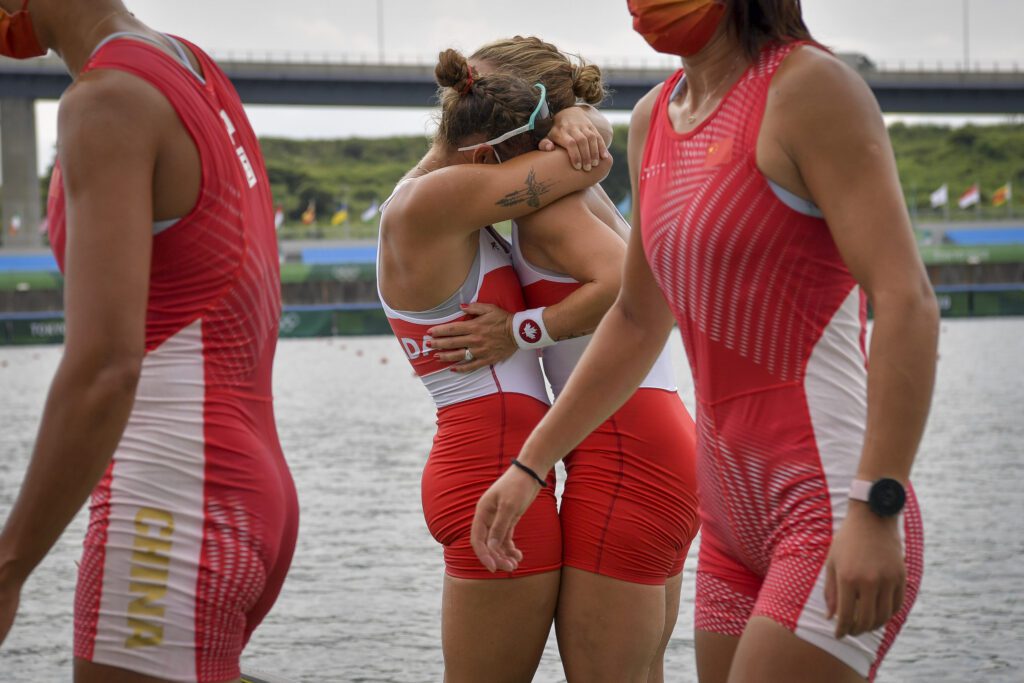
Photo CAN W8+ crew members embrace after winning Olympic gold
The backstory is overwhelming: the eight rowing for Kathleen Heddle, one of the winning 1992 oarswomen, who died in January of cancer aged 55. “We heard thunder at the start and right away in my head I was like ‘Oh that’s Kathleen, she’s here with us”, said cox Kirsten Kit. “Around 750m to go I called ‘What would Kathleen do?’ Every time I made a call the bow surged.” New Zealand, with Olympic stars Grace Prendergast and Kerri Gowler doubling up, were second with China breaking all previous rowing medal records coming third. “This crew was just put together 100 days out before the Olympics Games in Tokyo, so this medal is really a great recognition of our work”, said Guo Linlin from China. The Americans, heiresses to the champions of the last three Olympics, rather than claim a four-peat victory struggled past Australia to fourth. As the medals were being hung round Canadian necks, USA were already starting the postmortem on what had gone wrong.
Twenty minutes later New Zealand’s men buried the hurt of 49 years by claiming the first Olympic eights gold since 1972, anchored by legendary 2-man Hamish Bond. Tearing off the blocks alongside Britain, who were seeking redemption after a tricky week, the repechage winners mounted a dog-fight into which Germany butted within the first 500 metres. Back and forth the lead swung between the three as the eight strove for dominance, until the Kiwi bow seized the lead again and started to move out. Pushes from all sides, including lane 1 where the USA found a new gear, but it was too late: New Zealand were in the zone and surging towards the line with a scramble for second behind them which Germany won by 0.15 seconds though the British bow passed them half a stroke later. Breathless, historic, superlative racing.
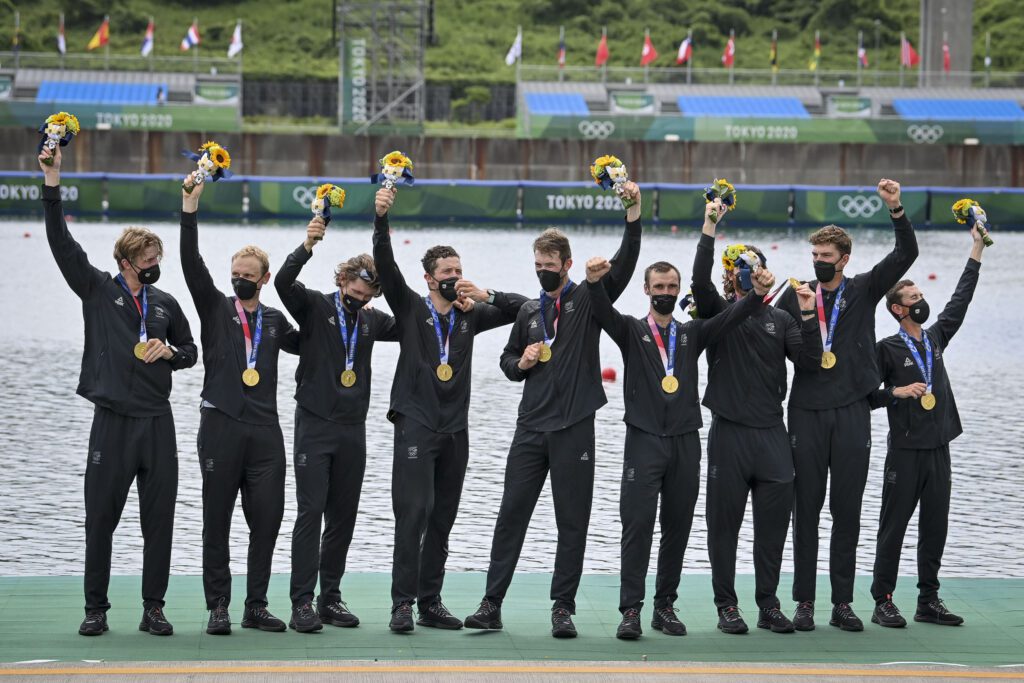
Photo NZL M8+ celebrate on the podium after winning gold in Tokyo
“Words can’t really describe the feeling right now,” said cox Sam Bosworth. “We crossed the line, and I couldn’t quite believe we’d done it.” “It was always my mission just to turn up and get back to my best, but also to set expectations on them”, said Bond of his young crewmates. “They weren’t intimidated by that, they were like ‘all right then old man, I’ll show you’. The eight is the blue-riband event for a reason. Feeling that power of eight people harnessing their physical potential for the collective good, that’s the pinnacle of the sport.”
“Congrats to the Kiwis, it was an amazing performance and today they were by far the fastest crew”, said Jakob Schneider from the German eight. “We always say that the last stroke counts and [the Germans] were able to make it count more than we did today”, said Jacob Dawson of the bronze medal British crew. “Moe Sbihi really guided us, a huge risk for him to go for another one. A massive portion of the Rio team decided to retire on a high, a huge risk for him to take on the challenge of a really new young team. But without him we wouldn’t be here with this medal round our necks.”
And so the sun set on the Tokyo harbour, and on the Olympic Regatta. Three years to go until Paris, and the crowning of the next champions. Eighteen countries on the medal table and eleven of them with gold. The next Olympic race starts tomorrow.
Bowballs – the little bit at the end
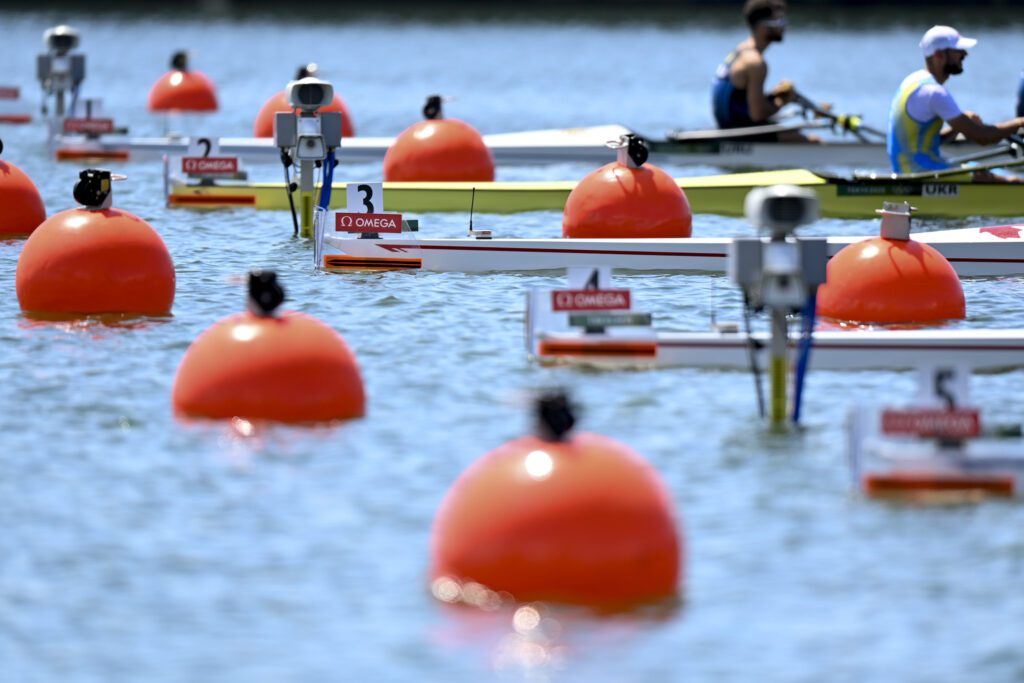
Quarantine woes
Information seeps out from the Tokyo 2020 official quarantine hotel: the Netherlands and USA sports federations filed a complaint about the state of the accommodation where the rowers and other athletes, coaches and staff have been forced to isolate after testing positive for COVID. The federations enlisted the help of the Dutch ambassador in Japan after isolated Olympians revealed that they were not allowed to see daylight (no proper windows) and not allowed outside even alone for 15 minutes a day (which is what isolating accredited people have been permitted). After the intervention, Dutch members in the quarantine hotel are now allowed to use a larger room together under supervision, and this room has windows which can be opened for fresh air. Reports do not mention whether the food, which has been described as “Japanese-oriented”, has been changed too. Josy Verdonkschot, the NED coach who had to go into isolation before any of his crews had raced medal finals, described his day thus to rowing website www.nlroei.nl: “At seven in the morning a signal sounds. Then I have to measure and transmit my temperature, blood values and heart rate. One hour later another sound signal. Then we may leave the room for a while to get breakfast. At twelve o’clock lunch. At four o’clock take temperature again. Six o’clock in the evening to pick up dinner. That’s it.” But he is adamant that he has not let affect him. “I can’t do anything about it. So I don’t spend any energy on it. That’s what I teach my athletes, too. It would be stupid for me to sit here moping.”
Remembering Mondelli
The Italian men’s quad which caught a massive boatstopper in the A-final on Wednesday, losing the chance of a medal just as they were pushing into contention, had the name of Filippo Mondelli written on its bow. Mondelli, a world champion in the M4x in 2018, discovered in February of 2020 that he had bone cancer in one of his legs, and had undergone surgery during the early part of the pandemic. It appeared to be successful but the cancer had returned and on 29th April 2021, took his life at the age of 26. His crewmates from 2018, Giacomo Gentili, Luca Rambaldi and Andrea Panizza, rowed with a new recruit, Simone Venier, in Tokyo.
Don’t drop the phone
Kristen Kit, cox of the Canadian women’s eight which stormed to victory, had what looked like her mobile phone tucked down her racing strip, taking it out after standing to celebrate the victory after the line. Electronic equipment is not banned in the boat as long as it is not used to communicate with coaches outside the crew. Given how far away it was from her ear, the obvious conclusion is that Kit was recording her voice for posterity. Now that would be a soundtrack worth listening to.
Right crew, wrong medal
ROC’s pairs oarswoman Elena Oriabinskaia nearly pinched the wrong medal, when offered the tray at the ceremony for the W2- where she and Vasilisa Stepanova came second behind Grace Prendergast and Kerri Gowler. IOC member Jiri Kejval held the tray out and Oriabinskaia took the gold before Stepanova pointed out it was the wrong one, and the ROC athlete quickly corrected herself. A few moments later the golds went round the neck of the Kiwis. And no, they weren’t disinfected in between.

